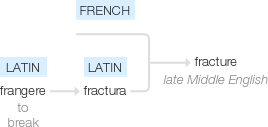Fracture
late Middle English: from French, or from Latin fractura, from frangere ‘to break’.
wiktionary
From Middle English fracture, from Old French fracture, from Latin fractūra(“a breach, fracture, cleft”), from frangere(“to break”), past participle fractus, ultimately from Proto-Indo-European *bʰreg-, from whence also English break. See fraction. Doublet of fraktur.
etymonline
fracture (n.)
early 15c., "a breaking of a bone," from Old French fracture (14c.) and directly from Latin fractura "a breach, break, cleft," from fractus, past participle of frangere "to break" (from PIE root *bhreg- "to break"). As "a broken surface" from 1794.
fracture (v.)
"cause a fracture in" (transitive), 1610s (implied in fractured), from fracture (n.). Intransitive meaning "become fractured" is from 1830. Related: Fracturing.
